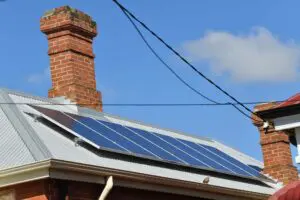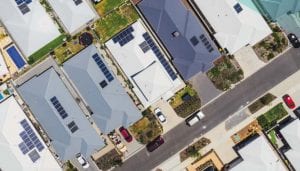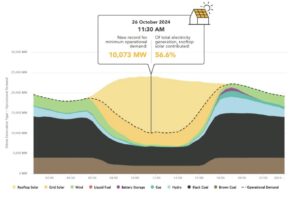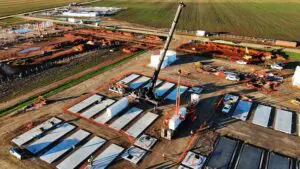Adelaide-based Australian PV panel manufacturer Tindo Solar has inked a deal with Reclaim PV that will see close to 100 per cent of solar the panels it produces and handles recycled and re-used – starting with the panels it removes from rooftops to replace with its own.
Reclaim PV began establishing itself as Australia’s first dedicated solar panel recycling company in 2014, and kicked off operations at its inaugural plant in July of this year in Lonsdale, South Austraila.
The company, which is also setting up a plant in Brisbane, Queensland, expects to recycle 70,000 panels a year at the South Australia plant alone, having been collecting and storing them over the past seven years.
Reclaim has also been working hard to drum up government and industry support for the venture, including signing up solar industry partners to its national recovery and recycling network, the latest being Tindo.
Tindo CEO Shayne Jaenisch, whose company has just boosted its panel production rate at a new factory in Adelaide said that while his company did not have an immediate solar panel landfill problem, its installation business replaced hundreds of end-of-life panels on roofs every month.
“We have partnered with Reclaim PV because … we recognise that a fully sustainable energy system requires a solution for its waste product, which in our industry is disused panels.
“Reclaim PV’s processes allow for a whole-life cycle approach to solar panels – meaning they needn’t become landfill. It’s a really important development in the energy transition and one that we’re very proud to be a part of.”
Reclaim PV’s recycling system follows a three-stage process of manual separation, then thermal separation, followed by a chemical process that sees close to 100 per cent of the solar panel recycled.
Resources recovered include aluminium, silicon, copper, silver, glass, and even recovered glue constituents. These are then re-used in the manufacture of new products.
According to Reclaim, the 2 per cent of the panel that currently can’t be recycled is the junction box. But the company is working with a “leading university” to come up with a solution to this particular problem.
“Waste is never waste. It is a resource, and we just need to treat it as such,” said Reclaim PV co-founder and director Clive Fleming.
“This is the key concept of the circular economy – that nothing is wasted, and everything is re-used as part of a continuous cycle. But this doesn’t work unless we’re all playing our part.
“The establishment of a national recovery and recycling network is an absolute necessity for the PV industry and for Australia which already has a solar panel disposal challenge on its hands.
“Reclaim PV is committed to providing an end-to-end solution to meet this challenge and to the responsible recovery and recycling of end-of-life solar panels.”
Reclaim’s deal with Tindo comes as pressure mounts on the solar industry to find a sustainable solution to the massive waste problem that looms when the first major wave of solar panels installed around Australia starts to be replaced or upgraded.
In June, federal environment minister Sussan Ley gave Australia’s solar sector less than 12 months to finalise an industry-led nationwide solar panel recycling scheme, following the tabling of the federal government’s Product Stewardship list in Parliament.
In a media release formalising the June 2022 deadline, Ley said that the current lack of an industry-wide approach to the problem meant that Australia’s world-leading solar success story loomed “as a landfill nightmare.”
The minister also noted that “previous submissions” from industry to address the problem had “lacked a cohesive, coordinated and sustainable approach,” even while conceding that solar panels had “languished” on the government’s own priority list for six years.
This received a “frustrated” collective response from industry, with both the Smart Energy Council and Clean Energy Council noting that the federal government’s own track record on “cohesive, coordinated and sustainable” policy was not so great.
The Morrison government has put some money where its mouth is, however, with its April offer of grant funding to boost the establishment of an Australian clean energy technology manufacturing industry making a point of including solar panel recycling initiatives.
And there have been other government and R&D initiatives – including a $10 million New South Wales grant scheme and various local university-based breakthroughs – helping to drive the solar panel recycling industry along.
Meanwhile, one of the nation’s first PV recycling facilities got up and running in Melbourne’s north in May, run by Melbourne based co-operative Lotus Energy.
Another company, a Melbourne-based entity called Elecsome, in late 2020 won a federal government grant to set up its own “first of its kind” solar panel upcycling plant.
That initiative is being led by industrial manufacturing company Ojas Group – the grant recipient – in partnership with RMIT and the University of Melbourne, and also aims to build a national network of collection points and facilities to provide cost-effective and environmentally sustainable PV solar panel upcycling services in Australia.
Good, independent journalism takes time, and money. But small independent media sites like RenewEconomy have been excluded from the tens of millions of dollars being handed out to big media companies from the social media giants. To enable us to continue to hold governments and big business to account on climate and the renewable energy transition, and to help us highlight the extraordinary developments in technology and projects that are taking place, you can make a voluntary donation here here to help ensure we can continue to offer the service free of charge and to as wide an audience as possible. Thank you for your support.










